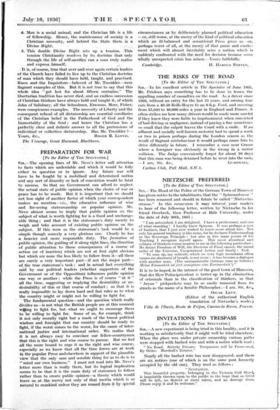PREPARATION FOR WAR
[To the Editor of THE SPECTATOR.]
SIR,—The opening lines of Mr. Neve's letter call attention to facts which are undeniable and which it would be folly either to question or to ignore. Any future war will have to be fought by a mobilised and determined nation and any sort of disunity or lack of conviction would be fatal to success. So that no Government can afford to neglect the actual state of public opinion when the choice of war or peace has to be made. But it is important that we should not lose sight of another factor of which your correspondent makes no mention—viz., the educative . influence of wise and far-seeing statesmanship. on ,popalar opinion. Mr. Neve almost seems to imply that public.opinion on the subject of what is worth fighting for is a fixed and unchange- able thing ; and that it is the statesman's duty merely to weigh and take account of existing public opinion on the subject. If this were so the statesman's task would be a simple though scarcely a very glorious one. Clearly he has a heavier and more responsible duty. The formation of public opinion, the guiding of it along right lines, the direction of public attention to those consequences of a course of action (or of inaction) which are not at first sight obvious but which are none the less likely to follow from it—all these are . surely a very important part—if not the major part— of the true statesman's task ; and in actual fact everything said by our political leaders (whether supporters of the GOvernment or of the Opposition) influences public opinion one way or another : while the Press is of course " at it " all the time, suggesting or implying the desirability or un- desirability of this or .that course of conduct ; so that it is really impossible to lay down hard and fast rules as to what the country might or might not be willing to fight for.
The fundamental question—and the question which really divides us—is not what the British people are at this moment willing to fight for, but what we ought to encourage them to be willing to fight for. Some of us, for example, think it not only morally right but a mark of the truest political wisdom and foresight that our country should be ready to fight, if the worst comes to the worst, for the cause of inter- national justice and international order. We realise that it is not always easy to convince our fellow-countrymen that this is the right and wise course to pursue. But we feel all the more bound to urge it as the right and wise course, especially as we know that all the time forces are at work in the popular Press and elsewhere in support of the plausible view that the only sane and sensible thing for us to do is to. "'mind our own business." I must not read into Mr. Neve's letter more than is really there, but its logical implication seems to be that it is the main duty of statesmen to follow rather than to create public opinion—a theory which would leave us at. the mercy not only of that inertia which is so natural to mankind unless they are roused from it by special circumstances or by deliberately planned political education —or, still worse, at the mercy of the kind of political education which an ill-balanced and sensational Press gives us—or, Perhaps worst of all, at the mercy of that panic and excite- ment which will almost inevitably seize a nation which is suddenly confronted with the need for decision because some illicitly unexpected crisis has ariseri.—Yours faithfully;










































 Previous page
Previous page